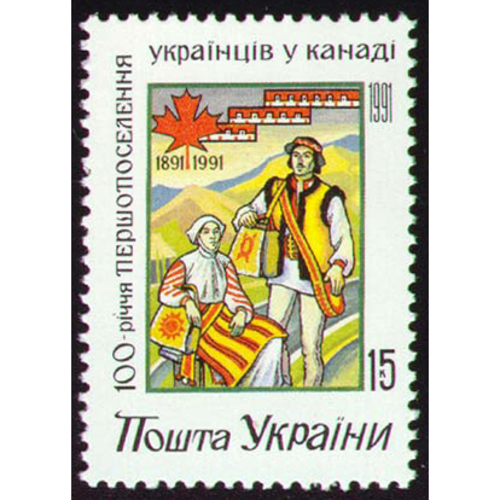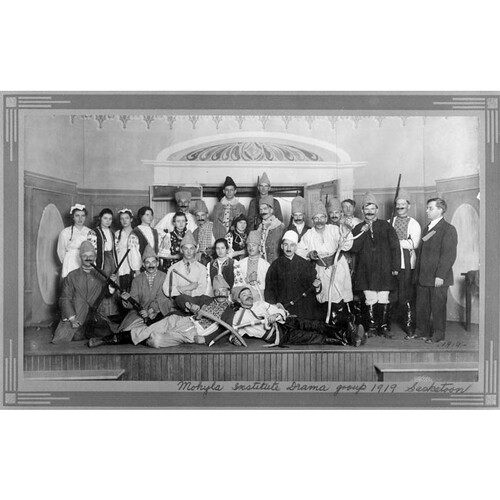HUMENILOVYCH, ANNA (Bochovs’kyy ; Yonker), maîtresse de maison et militante d’action communautaire, née le 8 décembre 1891 à Kalush, Galicie (Ukraine), fille de Dmytro Humenilovych et d’Anna Sorochtiw (Sorokhtiv) ; elle épousa Stepan Bochovs’kyy, et ils eurent un fils et une fille, puis le 25 avril 1918, elle épousa à Chicago, Illinois, le médecin Henry Lambert Yonker (décédé en 1968), et de ce mariage naquit une fille ; décédée le 6 mai 1936 à Winnipeg.
On ignore si Anna Humenilovych vint au Canada seule ou avec un parent. Sa biographe, Irena Knysh, présuma dans ses écrits de 1964 qu’Anna avait environ 17 ans lorsqu’elle et son père vinrent rejoindre des membres de leur famille déjà installés à Winnipeg, mais puisqu’elle arriva en 1905 ou plus tôt, elle n’avait sans doute que 13 ou 14 ans. Comme elle n’avait pas étudié au delà du primaire en Galicie, elle retourna d’abord à l’école, où elle apprit l’anglais. Peu après, son père repartit pour leur Kalush natal ; Anna resta au Canada. Elle avait l’intention de gagner de l’argent et de rentrer plus tard en Galicie. Pour des raisons inconnues, elle changea ses plans et, le 4 mai 1908, obtint sa naturalisation.
Après son premier mariage, Anna demeura pendant un certain temps à Edmonton, en Alberta, où elle donna naissance à un fils et à une fille. À la dissolution de ce mariage, elle retourna à Winnipeg avec les enfants, peut-être pour se rapprocher des siens. La tradition familiale des Yonker raconte comment l’histoire d’amour de conte de fées se développa entre la jeune femme et le sémillant médecin Henry Lambert Yonker (de descendance hollandaise américaine), pendant qu’elle travaillait chez lui comme domestique. Ils se marièrent en 1918.
Depuis son arrivée au Canada, Anna, femme intelligente et raffinée, avait pratiqué le bénévolat auprès d’organismes ukrainiens. Son mariage à un riche médecin lui procura les moyens financiers et le soutien moral dont elle avait besoin pour être encore plus active au sein de la communauté. Elle œuvra surtout auprès de l’Ukrainian Red Cross Society du Canada, constituée en 1919, et elle fut de ceux qui dirigèrent les secours aux victimes ukrainiennes de la Première Guerre mondiale. Elle siégea au comité central de cette société, créé au début de 1921 pour coordonner les initiatives des deux principaux organismes ukrainiens au Canada, soit l’Ukrainian Canadian Citizens’ League et l’Ukrainian National Council. Le comité offrait un appui matériel et politique à une Ukraine indépendante. Anna fut également une généreuse bienfaitrice de l’Ukrainian Red Cross Society. Les dons personnels importants qu’elle fit, bien qu’en grande partie destinés à des causes ukrainiennes au Canada, ainsi que ses remarquables talents en matière de collecte de fonds – elle organisa dans un milieu principalement prolétaire des campagnes de sollicitation à domicile, des ventes de charité, des rencontres à l’heure du thé et un festival de musique –, suscitèrent l’intérêt en dehors de la communauté ukrainienne. En 1927, elle fut membre d’un comité national destiné à venir en aide aux victimes d’inondations dans une région qui correspond aujourd’hui à l’ouest de l’Ukraine.
En 1922, Mme Yonker avait été cofondatrice d’une association locale de femmes ukrainiennes, puis elle devint présidente de celle qui lui succéda, l’Association of Canadian Ukrainian Women of Winnipeg, instaurée en 1928 dans le but de promouvoir des activités socioculturelles et éducatives. Elle représenta ce nouvel organisme auprès du Local Council of Women et en serait l’une des dirigeantes jusqu’à sa mort. Elle fut aussi membre active de l’importante Ukrainian National Home Association, qui était le centre des activités ukrainiennes à Winnipeg. Elle avait de multiples intérêts. Elle apporta ainsi son soutien au St Petro Mohyla Institute de Saskatoon. L’établissement, qui abritait la première résidence permanente pour étudiants, était le premier centre culturel dédié aux Ukrainiens du pays. Elle finança également la publication de livres d’auteurs canadiens d’origine ukrainienne, et elle soutint des productions de théâtre amateur et des clubs sociaux pour jeunes Ukrainiens.
Les initiatives de Mme Yonker en faveur d’une Ukraine indépendante et des Canadiens ukrainiens suscitèrent l’admiration de nombreuses personnes, notamment celle de la femme politique ukrainienne Olena Kysilevska et de la militante sociale Milena Rudnytska. Selon la biographe de Mme Yonker, l’œuvre de celle-ci impressionna la sénatrice Cairine Reay Wilson [Mackay*]. En 1930, Mme Yonker assista à la réunion du Conseil international des femmes, à Vienne. On dit qu’elle aurait sensibilisé la présidente du conseil, lady Aberdeen [Marjoribanks], à la cause des Ukrainiens.
En 1936, Anna Yonker succomba à une insuffisance rénale. Des centaines de personnes affligées, ukrainiennes et non ukrainiennes, assistèrent à ses funérailles et à son enterrement au cimetière Elmwood de Winnipeg. Dans sa monographie intitulée Patriotyzm Anny Ionker/The patriotism of Anna Yonker, Irena Knysh fait l’éloge de son sujet en tant que défenseur de la solidarité des femmes ukrainiennes. L’historienne Frances Swyripa la considère comme une pionnière qui sut tisser des liens entre les Ukrainiennes et des représentants de la communauté dominante. Même si Anna Yonker s’occupa principalement de promouvoir les activités et les intérêts des Canadiennes d’origine ukrainienne, ses efforts ne furent pas exclusivement consacrés aux affaires féminines. Au Canada, elle lutta pour des causes qui touchaient toute la communauté ukrainienne, et qui étaient importantes non seulement pour sa mère patrie, mais également pour son pays d’adoption.
Anna [Humenilovych] Yonker est l’auteure de « Moi vrazhennia z podorozhi do Halychyny i z pobutu na mizhnarodnim zhinochim kongresi u Vidni » [Mes impressions d’un voyage en Galicie et de ma participation au congrès international à Vienne], Kanadyiskyi farmer/Canadian Farmer (Winnipeg), 4, 11 févr. 1931 ; des extraits ont été publiés dans Irena Knysh et al., Na sluzhbi ridnoho narodu/In service of our homeland (2 vol., Winnipeg, 1955–1984).
Arch. privées, G. H. Myers (Lethbridge, Alberta), Passeports d’Anna et H. L. Yonker.— Winnipeg Free Press, 6 mai 1936.— June Dutka, « Anna Yonker (née Humenilovych), 1888–1936 : activist, philanthropist, patriot », dans Extraordinary ordinary women : Manitoba women & their stories, Colleen Armstrong, édit. (Winnipeg, 2000), 83–84.— Encyclopedia of Ukraine, Volodymyr Kubijovyc, édit. (5 vol. en 6, Toronto, 1984–1993).— Irena Knysh, Patriotyzm Anny Ionker/The patriotism of Anna Yonker (Winnipeg, 1964).— M. H. Marunchak, l’Histoire des Ukrainiens-Canadiens (2e éd., Winnipeg et Ottawa, 1982).— Frances Swyripa, Wedded to the cause : Ukrainian-Canadian women and ethnic identity, 1891–1991 (Toronto, 1993).
Cite This Article
Alexandra Pawlowsky, “HUMENILOVYCH, ANNA (Bochovs’kyy ; Yonker),” in Dictionary of Canadian Biography, vol. 16, University of Toronto/Université Laval, 2003–, accessed 15 décembre 2025, https://www.biographi.ca/en/bio/humenilovych_anna_16E.html.
The citation above shows the format for footnotes and endnotes according to the Chicago manual of style (16th edition). Information to be used in other citation formats:
| Permalink: | https://www.biographi.ca/en/bio/humenilovych_anna_16E.html |
| Author of Article: | Alexandra Pawlowsky |
| Title of Article: | HUMENILOVYCH, ANNA (Bochovs’kyy ; Yonker) |
| Publication Name: | Dictionary of Canadian Biography, vol. 16 |
| Publisher: | University of Toronto/Université Laval |
| Year of publication: | 2013 |
| Year of revision: | 2013 |
| Access Date: | 15 décembre 2025 |


![P. Mohyla Ukrainian Institute Drama Group, [Saskatoon, Saskatchewan.]. Original title: P. Mohyla Ukrainian Institute Drama Group, [Saskatoon, Saskatchewan.].](/bioimages/w600.2559.jpg)


